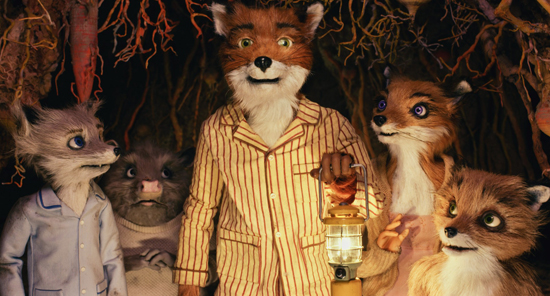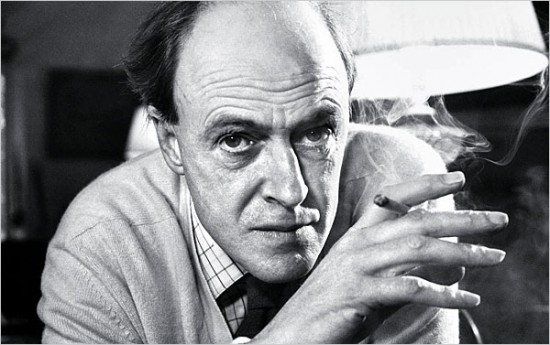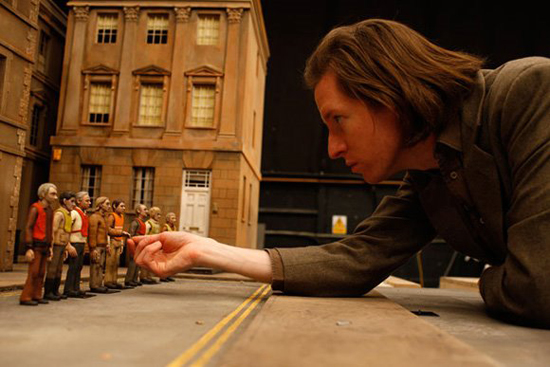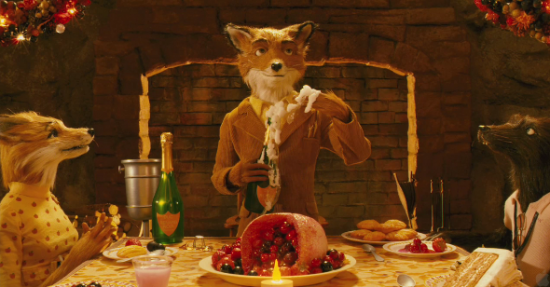Movie Review: Fantastic Mr. Fox
We may receive a commission on purchases made from links.
As I watched Fantastic Mr. Fox and gradually sensed the darkness of the theater lose out to the autumn-colored, classy, stop motion shenanigans on screen, I began to accept that every silhouette in the audience—fat and small, rich and me—was dressed in ship-shape, semi-formal attire. I pictured moms silently imagining themselves speaking in snooty English accents and serving cups of Earl Grey. And kids ages five through nine on the verge of zzz'ing in handsome jackets of tweed and corduroy; mildly stimulated by what equates to a visually dazzling hipster Sunday School lesson taught with Adderall on its gums and Tryptophan in its belly.
In contrast to Spike Jonze's Where the Wild Things Are—itself a furry and visionary 2009 adaptation of a famous kid's book about nonconformity—Wes Anderson's Fox focuses foremost on family via adult characters. Whereas Wild Things united male Eighties Babies with its look at psychological distress, a side effect birthed by so much of that decade's parental divorce and separation, Fox unites families of the aughts with an increasingly rare and welcome air of sophistication. One is a film about adults-as-wild-animals suitable for families, the other is a film about a child amidst wild animals suitable for would-be adults.Both films played hearty roles in the recognition of 2009 as a superb and original year for film. But it's too easy to forget that both were also preceded by worrisome, pre-release reputations; the hum of negative online buzz was aggressively stirred by each project's elitist-seeming stylistic risk-taking (and later supported by insider gossip or, sigh, test screenings). Here we are post-release as moviegoers, though, and both Fox and Wild Things are critically successful and amongst the best films of the year. It's funny: right when so many of us were ready to throw two of our most "too hip" directors under the bus, these guys embrace artistic maturity through accessibility...with all of their idiosyncratic signatures somehow intact.The cynic inside me says that Fox and Wild Things are selfish films made to impress and show-off creative carte blanche to more cynical, less connected creative types; but this jaded view evaporates when one optimistically looks around and forward. I feel like this is what Anderson and Jonze have done, thus creating films that will nudge talented, isolated youths and later inspire them to never compromise when it's their turn. In generational terms, Wes Anderson and Spike Jonze have respectively, done Roald Dahl and Maurice Sendak proud.And, maybe, just maybe, these films signal the beginning of the end to that fucking aughts archetype: the aimless man-child. Perhaps by way of directorial example and the spirit of ingenuity at decade's end, these works signify the arrival of the youthful, responsible-enough, creatively determined dad in pop culture. As our modern world continues to crumble, there has never been less reason to not sell out and not tune out. One for Dahl
One for Dahl
What worried me when I first began seeing images from Fantastic Mr. Fox was the impression that it would leave me cold, that its stop-motion, animated taxidermy would result in a pointless, throwback counterpart mirroring the obsessive, power-driven exercises synonymous with George Lucas and his computer generated Star Wars prequels. Picturing Wes Anderson holed up in Paris and and directing the film remotely with Draconian commands like, "You move that goddamn hair half-an-inch you shriveled fruit or that's your tush!" made me shudder. I also found it surprising, if not shocking, how few the instances I read beforehand that compared Fox and Tim Burton and Henry Selick's stop-motion adaptation of Roald Dahl's James and the Giant Peach, made for Disney and released in 1996.
I remember seeing Peach, desperately wanting to like (and not just appreciate) its painstaking animation. But ultimately it took months to shrug off my disappointment. (That Henry Selick had a surprise, stop-motion hit with Coraline this year should be noted, but will not be discussed further herein.) I was let down by how Peach seemed preoccupied with the mechanics of stop motion as to soak up most of the delicious wit and tongue-dripping imagery swimming in Roald Dahl's words. Leading up to the release of Fox, those feelings resurfaced.
And so did the overwhelming memories I have of reading Dahl's novel, Fantastic Mr. Fox, for the first time. It was the first book to literally make my mouth water, so irresistible were Dahl's endless, corrupted-epicurean descriptions of stolen and devoured fowl by the titular character. He wrote like a man possessed by hilarious, vicarious pleasure in having young boys secretly rediscover (or, I imagine, if read within an overtly religious household, discover) a primal bond by way of the carnivorous pillaging of a sly fox.
"Oh my cuss."

Immediately upon seeing the thousands of real hairs and furs in motion on screen, I felt that Wes Anderson's unorthodox choice and tone for animation—more so than his take on Dahl's story—was an embodiment of that youthful sensation. All my worries melted away in awe. On screen, Dahl's subversive ideas and go-getter love of life are fully realized by Anderson and his insanely talented team, even in small scenes like those showing how the Fox Family eats. But Dahl's man's-man spirit and dark humor is also ingrained in the smaller details. Faithful to the book, the confident, masculine Mr. Fox succumbs to his former wild ways by relieving farmers of their tasty birds. But in the film we connect with Mr. Fox's familiar hunger as a character by noticing how the fur on Fox's face is brushed oh so slightly, as if by a breeze.
Some viewers feel these brushes are a hat tip to and from the animators, sure, but in my mind, they are from the brush of Life. Mr. Fox is a dancer and a hunter. And the charming, hirsute twitches are a subtle reminder that we humans, in addition to messily partaking in the movie experience, messily partake in the same gross food chain as Mr. Fox. Our smiles are as full of teeth as Mr. Fox's, hiding a tongue that wants to lash its chops. And like the generations of smart, young kids who read Dahl's book(s), a new one will realize in the theater that the disguise of civility is what defines adults most of all. Mom might not get it. But for a reason she can't quite verbalize she really loves the Rat, so it's all good.
However, arguably unlike the work of Dahl, Wes Anderson's vision sees adults—both the foxes on screen and the humans in the audience—given the benefit of the doubt. Dressed every bit the dandy that Anderson aspires to be in photo shoots, Mr. Fox maintains his feral desires with admirable, upright posture. After an alarming wake-up call, he finds stable work as a newspaper columnist—an ironic, wistful touch in 2009—and is a fair parent, if adrift in former athletic, unethical prowess. He's aware of his tendencies, but hasn't thrown them out or stored them away. Perfectly voiced by George Clooney, Mr. Fox is every bit as solid and alpha-proud as a Heisman Trophy, but we sense him losing interest as a relic of superiority. Minor delusion seeps in from the corners of his domesticated fox hole, and it's a kick when, later, he's literally driven up a wall. (There is a fun, involuntary pause after this spazzy wall-crawl that nails the confused and dizzied satisfaction exhibited by dumb animals.)
Mr. Fox is also a natural born thief, and his inevitable relapses are punchy metaphors for womanizing, cheap thrills, and even alcoholism, the vices of man implied in Dahl's writings for kids (and explored in his writing for adults). It's a character that Frank Sinatra would have voiced, and noting some political parallels below, Clooney is not only the ideal voice for Mr. Fox, but the ideal modern star. For a children's film, Mr. Fox is far from a cookie-cutter protagonist and Anderson plays his ethical murkiness for quiet laughs. Expressive as his eyes are, even the occasional tears that well up inside Mr. Fox's are temporary and belie his ego. Mrs. Fox knows his ways all too well (as voiced by Meryl Streep, amazing but underused). And even though she had her wild days as well (shades of proto-swinging jokes), she confesses to his face that their marriage was a mistake. Alas, she loves him. Wes Anderson Releases The Fur Album at The Right TimeWes Anderson has become so synonymous with manicured, color coordinated, Criterion-approved but incredibly divisive works that he's practically a brand. However, in the latter half of the decade, even many of his adamant fans professed concern about diminishing returns and unfulfilled, longing expectations. It's become a cliche in social circles to do so, to such an extent that culturally, Anderson has become a Hollywood version of Weezer. His passionate fans seem to perpetually revert back to their love of Bottle Rocket (The Blue Album) and Rushmore (Pinkerton) and are forced to view everything else under a line of demarcation. Anderson has also risked limiting himself to movies about "the other half." In making a family film that vividly creates a hearth out of the working class lifestyle of Mr. Fox and his family, Anderson took a smart detour that packs resonance with its themes of survival, selflessness, and happiness. And more relevance still.
Wes Anderson Releases The Fur Album at The Right TimeWes Anderson has become so synonymous with manicured, color coordinated, Criterion-approved but incredibly divisive works that he's practically a brand. However, in the latter half of the decade, even many of his adamant fans professed concern about diminishing returns and unfulfilled, longing expectations. It's become a cliche in social circles to do so, to such an extent that culturally, Anderson has become a Hollywood version of Weezer. His passionate fans seem to perpetually revert back to their love of Bottle Rocket (The Blue Album) and Rushmore (Pinkerton) and are forced to view everything else under a line of demarcation. Anderson has also risked limiting himself to movies about "the other half." In making a family film that vividly creates a hearth out of the working class lifestyle of Mr. Fox and his family, Anderson took a smart detour that packs resonance with its themes of survival, selflessness, and happiness. And more relevance still.
Fox's greedy and determined adversary, the monopolistic farmer, Franklin Bean (Michael Gambon), is a well-to-do human that cherishes and lives for the hunt. Bean won't stop drilling an exceedingly massive hole in the ground until he gets what he wants (and what he wants is Mr. Fox, a symbol to go up over his Mantle of Power). Bean's an angry man with access to what appears to be endless corporate resources and manpower; whereas Mr. Fox simply depends on his older, Latin-admired cunning and home turf advantage. Alongside family and peers, Mr. Fox digs neverending holes and tunnels. Bean spares no expense in attempting to flush him out. Call in the reserves! Guess who wins in the end.
In the film's dazzling, madcap efforts to express Mr. Fox's passion and hunger of life, I began to recognize my growing appetite for animated, family films that are not only created by the human hand but unmistakably and unapologetically appear to be. As the holidays near—with their annual airings of Rankin-Bass and Charlie Brown Christmas films—I can't help but feel that Fantastic Mr. Fox has tapped into a growing sentiment about animation and family films that really found its footing this year. In recent weeks and months we've witnessed a chic resurgence of Jim Henson's Muppets (also: WTWTA); the aforementioned success of Coraline; the appearance of Sesame Street in the headlines; and on the indie front, growing buzz for the Belgian animated film A Town Called Panic and for the acclaimed animatronic documentary The Rock-afire Explosion. In my mind, Anderson's film consisting of thousands of "visible" fingerprints, real hairs and tea leaves, has won out in face of the grand cinematic finale of illusion said to be enabled to us this winter by computers, 3D effects, and $300 million plus with James Cameron's Avatar.
As I compile my best films of 2009, I do dig Pixar and think Up is one of their best, but deep inside, I feel a much more urgent and profound connection to Fantastic Mr. Fox. It's not simply a matter of preference for eye candy or personal taste, either. Or a seasonal bias. This aging and overpowering notion in pop-culture and the marketplace that computer animation rules all and is the best way to get moviegoers' and families' asses in seats ignores something vital: the love humans will forever have for seeing artists get their hands dirty in a literal sense.
It's a love created by antiquated habit and necessity, sure. But I would compare my difference in affection as a person to Up and Fantastic Mr. Fox to watching sunlight reflect off a beach ball on a perfect day and staring deep into a camp fire and never getting bored. There is a certain truth for why this latter feeling is more engaging. And by going against the odds to remind us, Wes Anderson has made the best animated film of the year and a perennial classic. (The only one ever to feature champagne bubbles and rabies made of cotton.) Raise a paw in the air and support it.
 Hunter Stephenson can be reached at h.attila/gmail and on Twitter.
Hunter Stephenson can be reached at h.attila/gmail and on Twitter.
